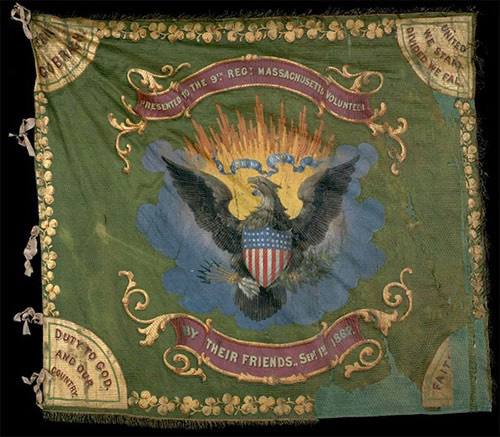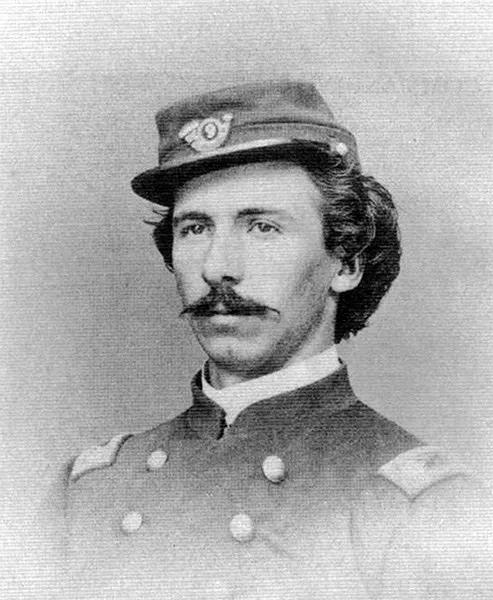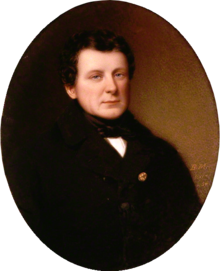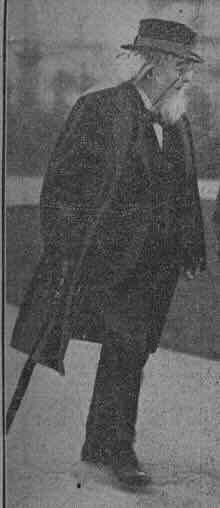- January 15, 1835
Patrick Robert Guiney (15 January 1835 in Parkstown, County Tipperary, Ireland – March 21, 1877 in Boston) was an American Civil War soldier.
He was a prominent figure in Irish history and the Irish diaspora in the United States. Guiney is best known for his military service during the American Civil War as a Union officer, where he played a significant role in raising and leading the 9th Massachusetts Infantry Regiment. This regiment was primarily composed of Irish immigrants.
Patrick Robert Guiney was the second and eldest surviving son of James Roger Guiney, who was descended from Jacobites, and Judith Macrae. James Guiney, impoverished after a failed runaway marriage, brought with him on his second voyage to New Brunswick his favourite child Patrick, then not six years old. After some years, Mrs. Guiney and their younger son, William, rejoined her husband recently crippled by a fall from his horse; they settled in Portland, Maine. The young Guiney worked as a wheel boy in a rope factory, and at the age of fourteen apprenticed to a machinist in Lawrence, Massachusetts, but stayed only a year and a half before returning to Portland.
Civil War
Familiar with the Manual of arms, Guiney enlisted for example’s sake as a private, refusing a commission from Governor John A. Andrew until he had worked hard to help recruit the 9th Massachusetts Infantry Regiment. By June 1861, Guiney was a captain. Within two years (July, 1862), the first colonel having died from a wound received in action, Lieutenant-Colonel Guiney succeeded Young to the command. He won high official praise, notably for courage and presence of mind at the Battle of the Chickahominy, or Gaines’s Mill, Virginia. Here, after three successive color-bearers had been shot down, the colonel himself reportedly seized the flag, threw aside coat and sword-belt, rose white-shirted and conspicuous in the stirrups, inspired a final rally, and turned the fortune of the day.
Guiney fought in over thirty engagements, including the Battle of Antietam, the Battle of Fredericksburg, and the Battle of Chancellorsville.
The 9th Massachusetts was present at Gettysburg in second brigade first division V Corps on July 1, 1863. Col Jacob B. Sweitzer the brigade commander, detached Guiney’s regiment for picket duty. Consequently, the regiment missed the second day’s fighting at the Battle of Gettysburg.

In 1864, through the battle of the Wilderness, Guiney frequently had been in command of his brigade, the second brigade, first division, Fifth Corps. After many escapes from dangerous combats without serious injury, he was shot in the face by a sharpshooter at the Battle of the Wilderness on May 5, 1864. The Minié ball destroyed his left eye, and inflicted, it was believed, a fatal wound. During an interval of consciousness, however, Guiney insisted on an operation which saved his life. Guiney was honorably discharged and mustered out of the U.S. Volunteers on June 21, 1864, just before the mustering out of his old regiment.
On February 21, 1866, President Andrew Johnson nominated Guiney for the award of the honorary grade of brevet brigadier general, to rank from March 13, 1865, for gallant and meritorious services during the war. The U.S. Senate confirmed the award on April 10, 1866.
Postbellum
Kept alive for years by nursing, he ran unsuccessfully for Congress on a sort of “Christian Socialist” platform, was elected assistant district attorney (1866–70), and acted as consulting lawyer (not being longer able to plead) on many locally celebrated cases.
Patrick Guiney’s military career and service in the American Civil War are notable aspects of his life. He is remembered for his leadership and contributions during a critical period in American history.

 ← Daniel O'Connell introduces debate on Repeal of Union bill in the House of Commons
← Daniel O'Connell introduces debate on Repeal of Union bill in the House of Commons George Sigerson, a physician, professor and writer, born in County Tyrone →
George Sigerson, a physician, professor and writer, born in County Tyrone →